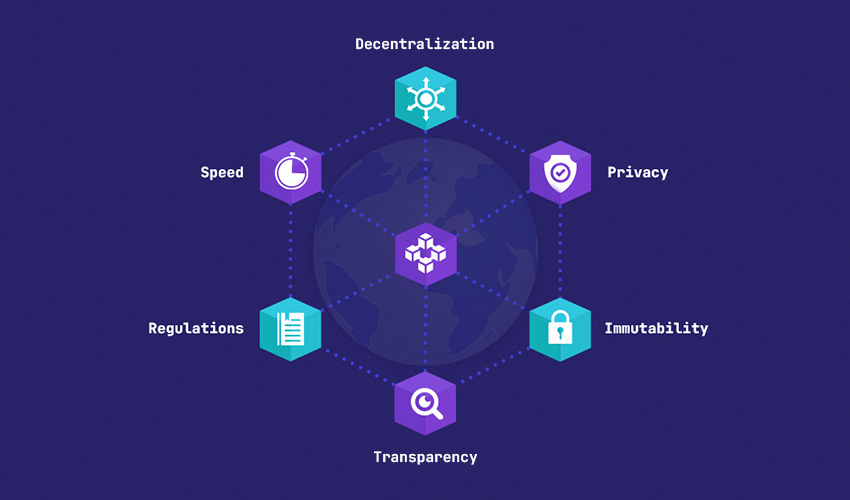Today, companies are exploring the potential of blockchain networks to improve transparency and optimize their existing business operations. Businesses will soon realize the versatility of this revolutionary technology and who would miss out on the opportunity to secure a position in the future blockchain market!
While there are different types of blockchains, organizations believe enterprise blockchain best suits their needs rather than a public blockchain network. So, what is an enterprise blockchain and what features of it make it a better option for enterprises? Enterprise blockchains are permissioned blockchains that give control to the company that owns them. This type of blockchain enables enterprises to restrict the visibility of their data to a selected group, set compliance requirements for transactions, add new members to the network, and more.
Why are public blockchains not suitable for enterprises?
The first kind of blockchains developed, a public blockchain platform is an open environment where any person can join the network and contribute to the consensus process. For example, Bitcoin cryptocurrency transactions happen over public ledgers. They’re truly decentralized and transparent. Every member of the network always has access to a copy of the ledger making them secure.
Public blockchain networks aren’t faultless. They’re anonymous in nature: participants do not reveal their identities during transactions and hence, they cannot be tracked down. A further downside is that public blockchain platforms lack regulation. Both of these characteristics raise the risk of malicious transactions occurring on the network. As such, a public blockchain platform isn’t appropriate for enterprise use cases. Yes, we can’t expect an enterprise to work in a non-regulated environment.
While public blockchains (features mentioned above) work best for an external platform, trying to incorporate it within an enterprise is quite problematic. To deal with these drawbacks of the public blockchains, enterprise blockchains were developed. They are not open to the public, but instead run by the businesses or consortiums that own them.
Types of enterprise blockchains
Private Blockchains
This type of enterprise blockchain belongs to a single organization and is not open for public participation. The central party who owns the network sets up rules and decides who can access data and conduct transactions. The owner has the power to alter the rules of the blockchain network at their will.
Consortium / Federated Blockchains
They’re owned by two or more parties where all of them agree to set network rules together. These types of blockchains suit industries where multiple companies are involved in creating value.
Why is enterprise blockchain so appealing?
As already touched upon, the traits of enterprise blockchains make them suitable for businesses. Business networks don’t require a bunch of features present in public networks and at the same time, demand a set of requirements that public blockchains lack to offer. Here are a few features that enable enterprise blockchains to support businesses.

Privacy
Enterprises constantly deals with sensitive data. It’s crucial that this data be kept safe. In an enterprise blockchain platform, only parties with authorization gain access to the data stored on the network, making it a perfect fit for companies that value privacy.
Decentralization
Enterprise blockchain platform stores data on a decentralized network that makes it more secure. The nodes with authorization can access the ledger anytime. Decentralization enables peer-to-peer connections, making the transactions faster.
Transparency
While privacy from a public blockchain is ensured, enterprise blockchains enables full transparency for anyone within the network. A copy of the ledger is available for all the members with permission. This helps to prevent fraudulent transactions and creates accountability.
Regulations
Norms and regulations are an integral part of any organization. Unlike public blockchains, enterprise blockchain platforms allow their owners to establish a set of rules for their members to adhere to. These rules must be observed for transactions to happen.
Partial Immutability
Blockchain networks in general are immutable by nature. This is one feature that makes public blockchain platforms attractive. When it comes to enterprises, sometimes data needs to be altered. Enterprise blockchain can allow this as long as all the owners and stakeholders within the network grant permission for doing so. Owners can also make the network immutable to guarantee security. Immutability protects enterprises not only from cyberattacks but also from internal corruption.
Speed
Blockchain enables more efficient transactions for data and money. It creates a distributed network that reduces transaction times to a few minutes. Transactions can be automated using smart contracts. Enterprise blockchains are faster than public blockchains because they have comparatively fewer transactions happening.
The future of enterprise blockchains
The enterprise application of blockchain technology is at a pivotal point. It outclasses traditional, centralized networks in multiple ways and experts are working on applying this technology to a broad range of business use-cases. An enterprise blockchain adoption can be more effective when multiple companies work together. Furthermore, this will be the perfect solution for enterprises looking to establish trust and transparency in data and financial management. The immense promise of enterprise blockchain (permissioned) acts as a catalyst for more and more enterprises to take a shot at this disruptive technology.
Blockchain technology is making a huge buzz, yet most companies are still struggling with its adoption. Enterprises struggle to identify the right blockchain platform or comprehend how blockchain could be a solution for their use case. As blockchain solutions are gaining momentum, blockchain as a service platforms like Blockedge are working towards making the adoption of blockchain effortless.
 Anantha Krishnan Aspiring author, creative marketer, and product marketer by trade, plans, creates and promotes strategic content to reach the target audience |
